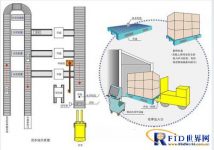
RFID logistics turnover pallet management system solution
[ad_1]
At present, RFID technology is bringing a huge change to the supply chain field. It can identify the incomparable advantages of barcodes such as long distance, fast, hard to damage, large capacity, etc., simplify the complicated work process, and effectively improve the efficiency and transparency of the supply chain.
Pallet is the most basic and most important unit of goods in the supply chain. It has been widely used in various supply chain links such as production, warehousing, logistics, and retail.

2. System composition
Pallet electronic label,Reader, Antenna, mobile reading and writing equipment, background management software.
Three, work flow
(1) Finished goods containers are put into storage-empty pallets with electronic tags enter the entrance of the pallet, and the electronic tags are read and written by the reader and writer device.
Guaranteed performance up to standardelectronic labelEnter the circulation link. The barcode scanning system scans the barcodes on the finished goods boxes that have passed the inspection, and palletizes them. The reader writes the compressed barcode information of the entire pallet box into the electronic label, realizes the association between the barcode and the label, and combines the information Pass it to the central management system.
(2) In the warehousing link, change pallet containers or assemble scattered containers — Use RFID mobile read-write equipment to re-associate the adjusted container data with the label, write new information into the label, and update the central database simultaneously .
(3) Pallet out of the warehouse—Collect electronic tag information through fixed RFID reading and writing equipment and buried antenna, and upload it to the central management system. After the system is verified, the data will be decompressed to form cargo box barcode information. Scan the docking of the commercial arrival scanning system.
(4) Receiving by the distribution center—the pallet stays in the reading area for 2-3 seconds to complete the scanning of the cargo boxes on the entire pallet, without the need to unstack a single piece, scan the code and then stack it.
Four, system advantages
This solution adopts passive electronic tags, with long life, maintenance-free, unique design, and can be well embedded in plastic pallets, and it is not easy to be impacted and worn during the transportation of the pallet. In addition, electronic tags can be repeatedly written into data, which is helpful to solve the warehousing and logistics problems of pallet cargo adjustment and assembly. The tags can be recycled, which greatly saves users’ costs.
The system realizes long-distance recognition, fast and reliable reading and writing, can adapt to dynamic reading such as conveyor belt operation, and adapts to cigarette production plants and other industrial production environments (stacking of cigarettes). It has good anti-metal interference ability and can overcome cigarette metal The influence of foil packaging on RFID identification meets the needs of modern logistics.
Advanced data compression technology is used in the label information processing, so that the electronic label carries the pallet load information (data packet), and only needs to scan the pallet electronic label once to understand the item information, eliminating the manpower required for disassembling and reinstalling the pallet Material resources, save time, reduce the error rate and the probability of damage to goods, realize fast and accurate inventory counting, and improve the overall transparency of enterprise logistics.
5. System implementation benefits
This solution adopts long-distance RFID technology, which greatly improves the speed and accuracy of scanning codes in and out of the warehouse, improves the operation efficiency of logistics, and solves the problems of rising labor costs and difficulties in on-site control caused by pallet removal and pallet loading. The successful application of the system in the logistics link has summarized the experience, laid the foundation and established a model for the application of RFID technology in the logistics field of the tobacco industry.
[ad_2]


